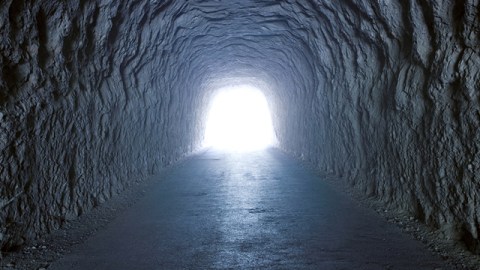The Science of Reincarnation?

In general, I avoid free literature thrown my way on subways and street corners. Recently passing by a stack of cheaply printed books while leaving Samosa House in Culver City, one caught my eye: Coming Back: The Science of Reincarnation. I pocketed a copy and walked through the door, interested to read the latest research in this slippery field.
Reincarnation is an attractive idea. That we only get one pass on this giant Ferris wheel can be cause for depression. Yet time and again, when exploring the numerous modalities of rebirth, from the law of karma to the hope of a better world beyond this one, we stumble into one glaring recurrence: By entertaining such philosophies, we inevitably waste valuable time wishing things here were different. Instead of changing our circumstances (or our attitude towards existence), we project our attention to some future destination.
The idea of rebirth is not new. Grave burials of Homo neanderthalensis date back to 200,000-75,000 BCE; ritual tools suggest reentry after being ‘returned’ to the original womb, the earth. Given that both hunting-gathering and agricultural societies (though, as Colin Tudge has suggested, they were one and the same before the advent of modern agriculture) relied on rebirth for grain and game, it makes sense that our forebears would believe our souls did the same. We plant a seed, it grows, flowers, dies, and the soil again rebirths sustenance during the next cycle.
Joseph Campbell thought our original ‘birth trauma’—the moment we exit the womb before our lungs begin to work, which results in an intense grasping of air that can cause dizziness and blackout—served as a fitting analogy for what we encounter whenever suffering trauma. Every ‘threshold passage’ we walk through is another metaphorical exit from the womb, which gave rise not only to the idea of being born again in this lifetime, but from lifetime to lifetime as well.
As a metaphor, rebirthing is poetic, and can prove useful in grappling with our lives. Rites of passage and overcoming personal trauma are great examples of how one can be rebirthed. When treated as a ‘science,’ reincarnation is a relic of our primitive past that we cannot seem to evolve beyond. Still, our spiritual traditions cling to this archaic idea by pretending a discipline ill-suited for such topics provides ‘proof’ of transmigration. This occurred recently in a ridiculously juvenile Newsweek cover story, which I will give no more ink as Sam Harris has thoroughly debunked it.
Coming Back relies on the Bhagavad Gita, a text written 2,200-2,500 years ago, for scientific proof of reincarnation. As a yoga instructor, I’ve turned to the Gita for metaphorical inspiration during various life challenges. Yet I’d never treat a scrape on my leg by sticking leeches on it, or by poking a hole in my skull. Why exactly we think allegorical tales penned millennia ago can be used today as scientific evidence is nonsensical, especially one based on an idea—karma—that was utilized by the wealthy Brahmanic class to oppress lower castes in claiming it was their birthright to be poor and uneducated.
We need not look back to witness such atrocities. Earlier this year the Texas Republican party wanted to banish critical thinking from schools. Its platform specifically citied behavior modification that occurs when using critical thinking as having the ‘purpose of challenging the students fixed beliefs.’ Considering this is the same party that created the ‘controversy’ over creationism not being taught in public schools, I certainly would not choose to learn my science from such a governing body.
Yet like ‘god,’ both the term and application of ‘science’ have been co-opted by groups that use it as an endorsement for whatever magical thinking they conjure. I can think of nothing more contemptible than living this life as a testing grounds to accumulate karma points or to enter a magical no man’s land of enduring bliss. Somehow we allow spiritual leaders to get away with such meaningless jargon. If we’re always waiting for something better to happen, we’ll always be in wait.
Perhaps the best reading on rebirth comes from Ernest Becker’s Pulitizer-winning book, The Denial of Death. He writes,
Neurosis is another word for describing a complicated technique for avoiding misery, but reality is the misery. That is why from earliest times sages have insisted that to see reality one must die and be reborn.
Psychological rebirth is, for Becker, a necessity in stripping away the existential shields one guards themselves with in the formation of their character, which he calls a “neurotic structure that went right to the heart of his humanness.” To get to the core of our being, we must move beyond the four layers devised by Fritz Perls: the first two are our social entities, followed by the unending dread of loneliness and then, finally, our fear of death. In this case, fantasizing about future lives as a ‘science’ falls into that category.
To be psychologically born again, however, has great merit, though it comes with a terrifying paradox:
One must be born not as a god, but as a man, or as a god-worm, or a god who shits.
That is, our true character requires an ‘ejection from paradise’ in order to face the pure fear and trembling that reality requires of us. To accomplish this, one must be willing to stop believing that the world was created for our benefit and come to terms with the sheer loneliness of existence. This is hardly different than Buddhist thought, though not the Zen quips you see plastered on calendars and Facebook walls.
In fact, Becker’s requirement for integration back into the rebirthed self is the same prescription offered by Buddhists, one simple yet hauntingly challenging word that we seem to rage against every time we claim to know the science of metaphorical thought: humility. In this word, we can have faith.
Photo: Carlos Castilla/shutterstock.com





